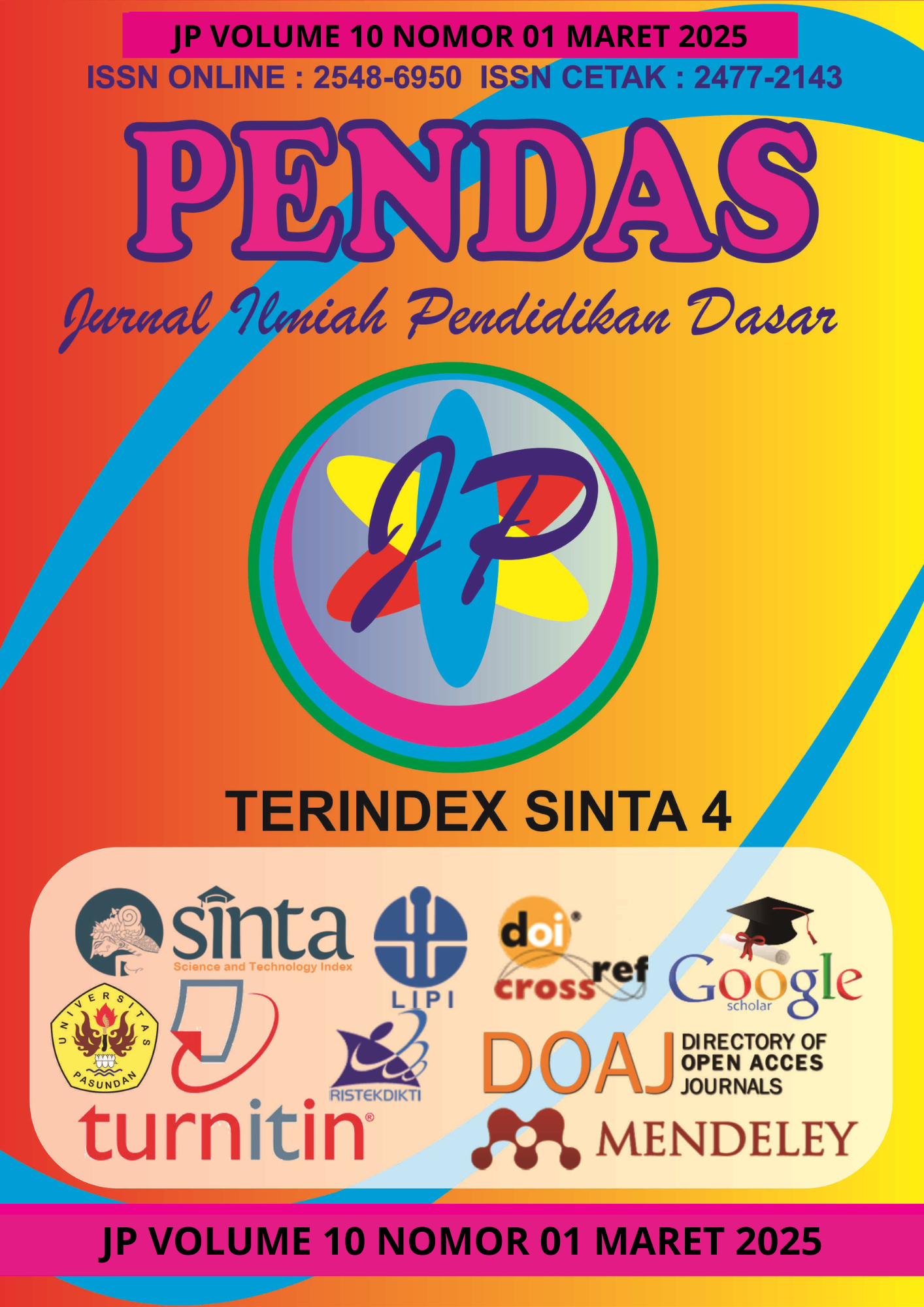KEMAMPUAN PEMECAHAN MASALAH MATEMATIKA MELALUI REALISTIC MATHEMATICS EDUCATION (RME) DAN STEAM UNTUK SISWA SEKOLAH DASAR
DOI:
https://doi.org/10.23969/jp.v10i01.23505Keywords:
Problem Solving, Learning Model RME, STEAMAbstract
This research is motivated by the importance of problem solving skills possessed by participants in preparing for the 21st era which requires students to have problem solving skills. This is caused by a number of factors, among others, low student interest in mathematics subjects, a learning process that still relies on the teacher as a provider of complete information about the material, learning methods that are still ineffective, and the learning model used is still inappropriate. The difficulty usually felt by teachers is the lack of knowledge in using the internet and developing an interesting learning model. This research uses a qualitative approach to the description method. The collection techniques in this study used tests, interviews, and observations. The analysis technique used in this research is data reduction, presenting data, and drawing conclusions. The results of this study indicate that students who have high mathematical problem solving ability are able to solve the two problems given correctly. Learners with moderate solving ability are able to fulfill several indicators of problem solving, while learners with low problem solving ability can be said to be unable to solve the problems given and do not fulfill several problem solving indicators.
Keywords: Problem Solving, Learning Model RME, STEAM
Downloads
References
Agustina, T. R., Subarinah, S., Hikmah, N., & Amrullah, A. (2021). Kemampuan Pemecahan Masalah Matematika Pada Soal Open Ended Materi Lingkaran Berdasarkan Kemampuan Awal Matematika Siswa. Griya Journal of Mathematics Education and Application, 1(3), 433–441. https://doi.org/10.29303/griya.v1i3.85
Anan Sutisna, M. P. (2021). METODE PENELITIAN KUALITATIF BIDANG PENDIDIKAN. UNJ PRESS. https://books.google.co.id/books?id=Z_UfEAAAQBAJ
Auliya, N. H., Andriani, H., Fardani, R. A., Ustiawaty, J., Utami, E. F., Sukmana, D. J., Istiqomah, R. R., & Abadi, H. (2020). Metode Penelitian Kualitatif & Kuantitatif. CV. Pustaka Ilmu. https://books.google.co.id/books?id=qijKEAAAQBAJ
Fitriana, I. N., & Mampouw, H. L. (2019). Skema Kognitif Siswa dalam Menyelesaikan Soal Peluang Ditinjau dari Pendekatan Polya. Mosharafa: Jurnal Pendidikan Matematika, 8(3), 353–364. https://doi.org/10.31980/mosharafa.v8i3.572
Junika, N., Izzati, N., & Tambunan, L. R. (2020). Pengembangan Soal Statistika Model PISA untuk Melatih Kemampuan Literasi Statistika Siswa. Mosharafa: Jurnal Pendidikan Matematika, 9(3), 499–510. https://doi.org/10.31980/mosharafa.v9i3.615
Lady, A., Utomo, B. T., & Lovi, C. (2018). Improving mathematical ability and student learning outcomes through realistic mathematic education (RME) approach. International Journal of Engineering and Technology(UAE), 7(2), 55–57. https://doi.org/10.14419/ijet.v7i2.10.10954
Laurens, T., Batlolona, F. A., Batlolona, J. R., & Leasa, M. (2018). How does realistic mathematics education (RME) improve students’ mathematics cognitive achievement? Eurasia Journal of Mathematics, Science and Technology Education, 14(2), 569–578. https://doi.org/10.12973/ejmste/76959
Mariam, S., Nurmala, N., Nurdianti, D., Rustyani, N., Desi, A., & Hidayat, W. (2019). Analisis Kemampuan Pemecahan Masalah Matematis Siswa MTsN Dengan Menggunakan Metode Open Ended Di Bandung Barat. Jurnal Cendekia : Jurnal Pendidikan Matematika, 3(1), 178–186. https://doi.org/10.31004/cendekia.v3i1.94
Nasrudin, J. (2019). Metodologi Penelitian Pendidikan: buku ajar praktis cara membuat penelitian. Pantera Publishing. https://books.google.co.id/books?id=j-igDwAAQBAJ
Rahmayanti, I., & Maryati, I. (2021). Kesalahan Siswa SMP pada Soal Pemecahan Masalah Berdasarkan Tahapan Teori Newman. Plusminus: Jurnal Pendidikan Matematika, 1(1), 61–70. https://doi.org/10.31980/plusminus.v1i1.1026
Rukin, S. P. M. S. (n.d.). Metodologi Penelitian Kualitatif. Yayasan Ahmar Cendekia Indonesia. https://books.google.co.id/books?id=GyWyDwAAQBAJ
Sari, N. P. (2020). Implementasi pembelajaran matematika realistik berbasis STEAM di sekolah dasar. Jurnal Pendidikan Dasar, 1–13.
Septriyana, Y., Fauzan, A., & Ahmad, R. (2019). The Influence of Realistic Mathematics Education (RME) Approach on Students’ Mathematical Problem Solving Ability. 173(Icei 2017), 9–12. https://doi.org/10.2991/icoie-18.2019.38
Shafira Hidayah, Riawan Yudi Purwoko, & Nur Ngazizah. (2023). Analisis Kemampuan Pemecahan Masalah Berdasarkan Teori Polya Materi Pecahan Di Sekolah Dasar. Jurnal Pendidikan Dan Ilmu Sosial (Jupendis), 1(1), 155–161. https://doi.org/10.54066/jupendis-itb.v1i1.116
Silvi, F., Witarsa, R., & Ananda, R. (2020). Kajian Literatur tentang Kemampuan Pemecahan Masalah Matematika dengan Model Problem Based Learning pada Siswa Sekolah Dasar. Jurnal Pendidikan Tambusai, 4(3), 3360–3368. https://www.jptam.org/index.php/jptam/article/view/851%0Ahttps://jptam.org/index.php/jptam/article/view/851
Sulistiyorini, & Setyaningsih, N. (2016). Analisis kesulitan siswa dalam pemecahan masalah soal cerita matematika pada siswa SMP. Seminar Nasional Pendidikan Matematika, Vol. 5(3), 1–9. https://journal.lppmunindra.ac.id/index.php/jkpm/article/view/6610/0
Umar Sidiq, M.Ag Dr. Moh. Miftachul Choiri, M. (2019). Metode Penelitian Kualitatif di Bidang Pendidikan. In Journal of Chemical Information and Modeling (Vol. 53, Issue 9). http://repository.iainponorogo.ac.id/484/1/METODE PENELITIAN KUALITATIF DI BIDANG PENDIDIKAN.pdf
Yusri, A. Y. (2018). K EMAMPUAN P EMECAHAN M ASALAH M ATEMATIS S ISWA MELALUI M ODEL P EMBELAJARAN L EARNING C YCLE 7E DAN P ROBLEM B ASED L EARNING Mosharafa : Jurnal Pendidikan Matematika kegiatan pembelajaran yang menarik adalah pembelajaran yang berpusat pada siswa . pemb. Jurnal Mosharafa, 7(September), 425–432.
Zubaidah, S. (2019). STEAM (science, technology, engineering, arts, and mathematics): Pembelajaran untuk memberdayakan keterampilan abad ke-21 [STEAM (Science, Technology, Engineering, Arts, and Mathematics): Learning to Empower 21st Century Skills]. Seminar Nasional Matematika Dan Sains, September, 1–18
Downloads
Published
Issue
Section
License
Copyright (c) 2025 Pendas : Jurnal Ilmiah Pendidikan Dasar

This work is licensed under a Creative Commons Attribution 4.0 International License.














































